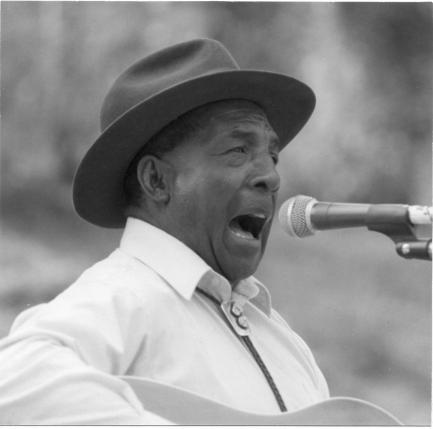Smithsonian Folkways Spotlights Black Appalachian Musician John Jackson's “Rappahannock Blues” Out June 15
Smithsonian Folkways is releasing “Rappahannock Blues,” a 20-track album by John Jackson, on June 15. Jackson (1924–2002) was the most important black Appalachian musician to come to broad public attention during the mid-1960s. The album is the latest addition to the Smithsonian Folkways African American Legacy Recordings series, co-produced with the Smithsonian National Museum of African American History and Culture.
Raised in a large, musical farm family in Rappahannock County, Virginia, Jackson got his first guitar when he was nine, bought from a catalog by his oldest sister Mary for $3.75. He learned a wide-ranging stock of songs from his father, his aunt Etta and from 78-rpm recordings by the Carter Family, Jimmie Rodgers, Blind Blake and Blind Lemon Jefferson, but after a fight at a house party in 1946, didn't touch an instrument for nearly 20 years.
Rediscovered at a gas station by folklorist Chuck Perdue, Jackson was quickly recorded by Arhoolie Records in 1964, laying down 90 songs in 12 hours during his first session. For the next three decades, he enthralled audiences with his vintage style and repertoire, though he worked day jobs his entire career, including a long stint as a gravedigger and cemetery caretaker.
Although black Appalachian music never received the attention given to the transition from Delta blues to Chicago blues and then to rock ‘n’ roll, a shared black and white string band tradition in the mountains served as the basis for American roots music, ranging from bluegrass to regional rockabilly. Emphasizing that shared heritage, Jackson toured Asia in 1984 with Ricky Skaggs, Buck White and Jerry Douglas. Two years later, he was designated a National Heritage Fellow by the National Endowment for the Arts.
Culled from hundreds of live concert recordings from the Smithsonian Folkways archives, the twenty tracks of “Rappahannock Blues,” which include Blind Blake's “Too Tight Rag,” “West Coast Rag” and “Diddy Wah Diddy,” Mississippi John Hurt’s “Candy Man,” and “Red River Blues,” recorded by Josh White as “Blood Red River” and by Blind Boy Fuller as “Bye Bye Baby,” highlight John Jackson the way he said he most wanted to be remembered – as a bluesman. All but two of the tracks are previously unreleased.
The release of “Rappahannock Blues” will be celebrated at the 2010 Tinner Hill Blues Festival: A Tribute to John Jackson, from June 10-13, 2010 in Falls Church, Va. (Washington, D.C. area). For more information, visit http://www.tinnerhill.org/blues/.
John Jackson – “Rappahannock Blues” (*denotes previously unreleased track)
Track Listing
1. Rocks and Gravel (John Jackson) *
2. Too Tight Rag (Blind Blake) *
3. Candy Man (Mississippi John Hurt) *
4. Truckin’ Little Baby (Blind Boy Fuller)*
5. Railroad Bill (traditional)
6. Nobody’s Business (If I Do) (traditional) *
7. Don’t You Want to Go Up There (trad.; arr. John Jackson) *
8. The Year Clayton Delaney Died (Tom T. Hall) *
9. John Jackson’s Breakdown (John Jackson) *
10. Red River Blues (traditional) *
11. Brown’s Ferry Blues (The Delmore Brothers) *
12. Cindy (trad.; arr. John Jackson) *
13. You Ain’t No Woman (Bill Jackson) *
14. John Henry (traditional)
15. Diddy Wah Diddy (Blind Blake) *
16. Just a Closer Walk with Thee (Kenneth Morris) *
17. Frankie and Johnny (traditional) *
18. Don’t Let Your Deal Go Down (trad.; arr. John Jackson) *
19. Step It Up and Go (Blind Boy Fuller; arr. John Jackson) *
20. West Coast Rag (Blind Blake) *
NOTE: Smithsonian Folkways Recordings retail distribution is through ADA (Alternative Distribution Alliance) at (800) 239-3232. Smithsonian Folkways Recordings releases are available through record and book outlets. Smithsonian Folkways Recordings, as well as the original Folkways, Cook, Dyer-Bennet, Monitor, Paredon, Fast Folk, Collector, M.O.R.E., I.L.A.M. and A.R.C.E. collections, are available via mail order at (888) FOLKWAYS or (800) 410-9815 and via the Internet. Visit the Smithsonian Folkways Recordings website at www.folkways.si.edu and www.smithsonianglobalsound.org.
# # #



